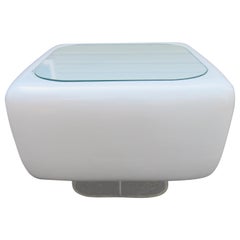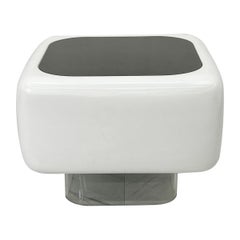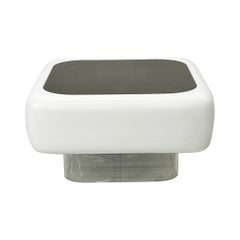William Andrus Table
Vintage 1970s American Mid-Century Modern End Tables
Glass, Fiberglass, Lucite
Recent Sales
Vintage 1970s American Space Age Coffee and Cocktail Tables
Fiberglass, Plexiglass
Vintage 1970s American Space Age Coffee and Cocktail Tables
Fiberglass, Plexiglass
Vintage 1970s American Mid-Century Modern Sofas
Leather, Fiberglass, Lucite
Vintage 1970s American Mid-Century Modern End Tables
Mirror, Plastic
Vintage 1970s American Mid-Century Modern Sofas
Leather, Fiberglass, Lucite
People Also Browsed
Vintage 1960s Mid-Century Modern Screens and Room Dividers
Mirror
Late 20th Century American Post-Modern Lounge Chairs
Leather
1990s French Mid-Century Modern Armchairs
Steel
Mid-20th Century Unknown Space Age Lounge Chairs
Plastic
Vintage 1960s Italian Space Age Armchairs
Leather, Fiberglass
Vintage 1980s French Post-Modern Wall Lights and Sconces
Brass
Vintage 1970s Space Age Lounge Chairs
Fabric, Fiberglass
Vintage 1960s Space Age Coffee and Cocktail Tables
Metal
Vintage 1970s German Space Age Coffee and Cocktail Tables
Aluminum
Vintage 1970s American Space Age Tables
Chrome
Vintage 1950s American Dry Bars
Iron
Vintage 1970s Italian Space Age Armchairs
Aluminum
Vintage 1970s Armchairs
Metal
20th Century Dutch Mid-Century Modern Lounge Chairs
Metal
Vintage 1970s Belgian Space Age Chandeliers and Pendants
Plastic, Plexiglass
20th Century German Mid-Century Modern Chandeliers and Pendants
Metal
Steelcase for sale on 1stDibs
The Michigan-based furniture maker Steelcase has a long and distinguished history, but collectors focus on its vintage office furniture and desk chairs from the 1950s to the ’70s, when, along with such companies as Knoll and Herman Miller, the firm helped define the aesthetics of American mid-century modernism.
Steelcase was founded in Grand Rapids in 1912 as the Metal Office Furniture Company, promoting steel desks and other furnishings as safer, fireproof alternatives to wooden pieces at a time when smoking in the workplace was common. Boston’s first skyscraper — the 32-story Customs House — was furnished by the company in 1915. Frank Lloyd Wright, an American architect and furniture designer whose work had a profound influence on the shape of modern life, turned to the firm in 1937 to fabricate the enameled metal chairs and desks for his Johnson Wax Headquarters in Racine, Wisconsin.
In the 1950s, when Steelcase formally adopted the name it still uses today, the company developed a sleek and functional style employing rectilinear chrome frames for glass-topped tables and upholstered seating pieces. The look is similar to that of the minimal, Bauhaus-inspired designs of Florence Knoll, another icon of furniture design who helped shape the ethos of the postwar business world.
By the 1970s, Steelcase had enlivened its styling, offering such pieces as chairs and side tables designed by Gardner Leaver, with circular bases and curving supports. As you will see on these pages, Steelcase designs offer a perfect foundation for a modernist decor, with a touch of flair.
Find vintage Steelcase furniture on 1stDibs.
Materials: Plastic Furniture
Arguably the world’s most ubiquitous man-made material, plastic has impacted nearly every industry. In contemporary spaces, new and vintage plastic furniture is quite popular and its use pairs well with a range of design styles.
From the Italian lighting artisans at Fontana Arte to venturesome Scandinavian modernists such as Verner Panton, who created groundbreaking interiors as much as he did seating — see his revolutionary Panton chair — to contemporary multidisciplinary artists like Faye Toogood, furniture designers have been pushing the boundaries of plastic forever.
When The Graduate's Mr. McGuire proclaimed, “There’s a great future in plastics,” it was more than a laugh line. The iconic quote is an allusion both to society’s reliance on and its love affair with plastic. Before the material became an integral part of our lives — used in everything from clothing to storage to beauty and beyond — people relied on earthly elements for manufacturing, a process as time-consuming as it was costly.
Soon after American inventor John Wesley Hyatt created celluloid, which could mimic luxury products like tortoiseshell and ivory, production hit fever pitch, and the floodgates opened for others to explore plastic’s full potential. The material altered the history of design — mid-century modern legends Charles and Ray Eames, Joe Colombo and Eero Saarinen regularly experimented with plastics in the development of tables and chairs, and today plastic furnishings and decorative objects are seen as often indoors as they are outside.
Find vintage plastic lounge chairs, outdoor furniture, lighting and more on 1stDibs.
Finding the Right Tables for You
The right vintage, new or antique tables can help make any space in your home stand out.
Over the years, the variety of tables available to us, as well as our specific needs for said tables, has broadened. Today, with all manner of these must-have furnishings differing in shape, material and style, any dining room table can shine just as brightly as the guests who gather around it.
Remember, when shopping for a dining table, it must fit your dining area, and you need to account for space around the table too — think outside the box, as an oval dining table may work for tighter spaces. Alternatively, if you’ve got the room, a Regency-style dining table can elevate any formal occasion at mealtime.
Innovative furniture makers and designers have also redefined what a table can be. Whether it’s an unconventional Ping-Pong table, a brass side table to display your treasured collectibles or a Louis Vuitton steamer trunk to add an air of nostalgia to your loft, your table can say a lot about you.
The visionary work of French designer Xavier Lavergne, for example, includes tables that draw on the forms of celestial bodies as often as they do aquatic creatures or fossils. Elsewhere, Italian architect Gae Aulenti, who looked to Roman architecture in crafting her stately Jumbo coffee table, created clever glass-topped mobile coffee tables that move on bicycle tires or sculpted wood wheels for Fontana Arte.
Coffee and cocktail tables can serve as a room’s centerpiece with attention-grabbing details and colors. Glass varieties will keep your hardwood flooring and dazzling area rugs on display, while a marble or stone coffee table in a modern interior can showcase your prized art books and decorative objects. A unique vintage desk or writing table can bring sophistication and even a bit of spice to your work life.
No matter your desired form or function, a quality table for your living space is a sound investment. On 1stDibs, browse a collection of vintage, new and antique bedside tables, mid-century end tables and more .


